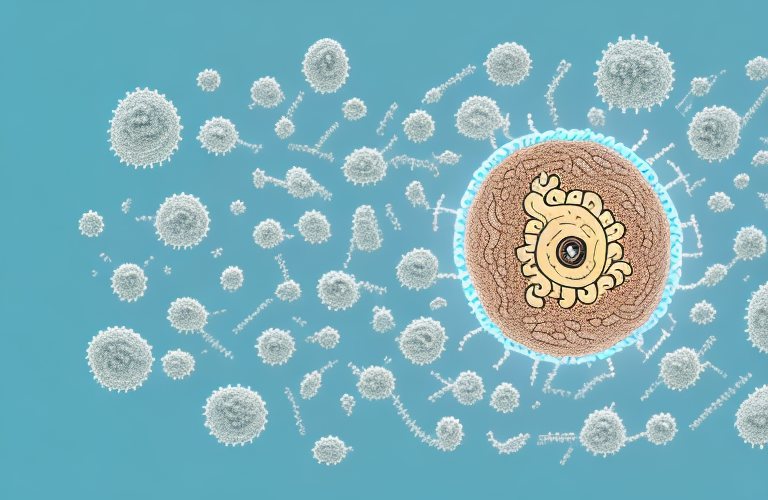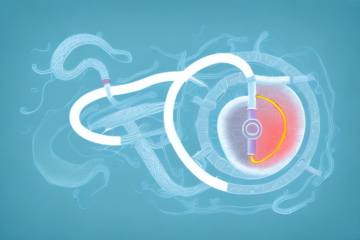Gastroenteritis, commonly known as stomach flu or food poisoning, is a condition that affects the digestive system, causing inflammation of the stomach and intestines. It is most commonly caused by a virus, such as norovirus or rotavirus, but can also be caused by bacteria or parasites. Gastroenteritis can be a mild, self-limited illness that resolves on its own, or it can be severe and require medical intervention. In this article, we will discuss in detail the causes, symptoms, and treatment options for gastroenteritis, as well as how to prevent its spread, and when to seek medical attention.
What is Gastroenteritis and How Does it Occur?
Gastroenteritis is a condition in which the digestive tract becomes inflamed, leading to symptoms such as diarrhea, nausea, and vomiting. It can be caused by a wide range of pathogens, including viruses, bacteria, and parasites, and can be contracted through contaminated food or water, or through close contact with an infected person. Once the virus, bacteria, or parasite enters the body, it can cause inflammation and irritation in the lining of the digestive tract, leading to the symptoms of gastroenteritis.
There are several risk factors that can increase the likelihood of contracting gastroenteritis. These include living in crowded or unsanitary conditions, traveling to areas with poor sanitation, and having a weakened immune system. Children, elderly individuals, and those with chronic illnesses are also more susceptible to gastroenteritis.
Treatment for gastroenteritis typically involves rest, hydration, and over-the-counter medications to manage symptoms. In severe cases, hospitalization may be necessary to prevent dehydration and provide supportive care. Prevention measures include practicing good hygiene, such as washing hands frequently and thoroughly, and avoiding contact with individuals who are sick or have recently been sick with gastroenteritis.
Causes and Risk Factors of Gastroenteritis
As mentioned, gastroenteritis can be caused by a variety of pathogens, with the most common culprits being viruses such as norovirus and rotavirus. Bacterial gastroenteritis is less common, but can be caused by strains such as Escherichia coli (E. coli), Salmonella, and Campylobacter. Parasitic gastroenteritis is also possible, and can be caused by parasites such as Giardia and Cryptosporidium.
The risk of contracting gastroenteritis is higher in certain populations, including young children, older adults, and people with weakened immune systems. Additionally, people living in areas with poor sanitation or hygiene practices are also at a higher risk of contracting gastroenteritis.
It is important to note that gastroenteritis can also be caused by consuming contaminated food or water. This can happen when food or water is not properly handled, cooked, or stored. In some cases, outbreaks of gastroenteritis can occur in communities or at events where large groups of people are consuming food or water from a common source. It is important to practice good food and water safety habits to reduce the risk of contracting gastroenteritis.
Symptoms of Gastroenteritis: From Mild to Severe
The symptoms of gastroenteritis can vary depending on the severity of the illness, but typically include diarrhea, nausea, vomiting, abdominal pain or cramping, and fever. In mild cases, the symptoms may be similar to those of the flu, including a low-grade fever, body aches, and fatigue. In more severe cases, the diarrhea can be profuse and accompanied by dehydration, which can be life-threatening.
It is important to note that gastroenteritis can be caused by a variety of factors, including viruses, bacteria, and parasites. In some cases, the symptoms may be mild and resolve on their own within a few days. However, if you experience severe symptoms or if your symptoms persist for more than a few days, it is important to seek medical attention. Your doctor may recommend treatment options such as rehydration therapy or medication to help manage your symptoms.
Diagnosis of Gastroenteritis: Tests and Procedures
The diagnosis of gastroenteritis is typically made based on a patient’s symptoms and a physical examination. However, in some cases, a doctor may order tests such as stool analysis to confirm the presence of a pathogen. Blood tests may also be ordered to check for signs of dehydration or electrolyte imbalances.
In addition to stool and blood tests, imaging tests such as an abdominal X-ray or ultrasound may be ordered to rule out other conditions that may be causing the symptoms. In rare cases, a doctor may also perform a colonoscopy or endoscopy to examine the digestive tract for any abnormalities or signs of inflammation.
Treatment Options for Gastroenteritis, Including Medications and Home Remedies
In most cases, gastroenteritis can be treated at home with rest, hydration, and over-the-counter medications to manage symptoms such as diarrhea and fever. In cases where dehydration is present, intravenous (IV) fluids may be necessary to restore fluid levels and prevent complications. In severe cases of bacterial or parasitic gastroenteritis, antibiotics or antiparasitic medications may also be necessary.
It is important to note that while home remedies such as drinking clear fluids and eating bland foods can help alleviate symptoms, they should not be relied upon as the sole treatment for gastroenteritis. It is always recommended to consult with a healthcare provider to determine the best course of treatment, especially in cases where symptoms persist or worsen.
How to Prevent the Spread of Gastroenteritis: Hygiene Tips and Precautions
The best way to prevent the spread of gastroenteritis is to practice good hygiene habits, including hand-washing with soap and water, particularly after using the bathroom, changing diapers, or handling food. Additionally, it is important to avoid close contact with people who are sick, and to avoid sharing food or drinks with others.
Another important precaution to take is to disinfect surfaces that may have come into contact with the virus, such as doorknobs, countertops, and bathroom fixtures. This can be done using a solution of bleach and water or a disinfectant spray. It is also recommended to wash any clothing or linens that may have been contaminated with the virus in hot water and detergent.
When to Seek Medical Attention for Gastroenteritis
If you experience severe symptoms such as dehydration, bloody stools, or persistent vomiting, it is important to seek medical attention immediately. Additionally, if you have a weakened immune system or are at high risk for complications, it may be necessary to seek medical attention even for mild symptoms.
It is also important to seek medical attention if your symptoms do not improve within a few days or if they worsen over time. This could be a sign of a more serious underlying condition that requires medical treatment.
Furthermore, if you have recently traveled to a foreign country or have been in contact with someone who has been diagnosed with gastroenteritis, it is important to seek medical attention as soon as possible. This can help prevent the spread of the illness and ensure that you receive appropriate treatment if necessary.
Complications Associated with Gastroenteritis: Dehydration, Malnutrition, and More
Complications associated with gastroenteritis can include dehydration, electrolyte imbalances, malnutrition, and in rare cases, sepsis or organ failure. It is important to seek medical attention if symptoms are severe or prolonged, in order to prevent complications.
Dehydration is one of the most common complications associated with gastroenteritis. This occurs when the body loses too much fluid and electrolytes due to vomiting and diarrhea. Symptoms of dehydration include dry mouth, thirst, dark urine, and fatigue. In severe cases, dehydration can lead to shock and even death.
Malnutrition is another potential complication of gastroenteritis. When the body is unable to absorb nutrients due to inflammation in the digestive tract, malnutrition can occur. This can lead to weakness, fatigue, and a weakened immune system, making it harder for the body to fight off infections.
Differences Between Viral and Bacterial Gastroenteritis
While the symptoms of viral and bacterial gastroenteritis may be similar, there are some differences between the two. Bacterial gastroenteritis is more likely to cause severe symptoms such as high fever, bloody diarrhea, and abdominal pain. Viral gastroenteritis, on the other hand, is typically milder and shorter-lived, with symptoms lasting only a few days.
It is important to note that the treatment for viral and bacterial gastroenteritis is different. Bacterial gastroenteritis may require antibiotics to clear the infection, while viral gastroenteritis is typically treated with rest, hydration, and over-the-counter medications to manage symptoms. It is important to consult a healthcare provider if you suspect you have gastroenteritis, as they can help determine the cause and appropriate treatment.
The Role of Probiotics in Managing and Preventing Gastroenteritis
Probiotics, or “good” bacteria found in the gut, may have a role in managing and preventing gastroenteritis. Some studies have shown that probiotic supplements may help to reduce the severity and duration of diarrhea associated with gastroenteritis, and may also help to prevent future episodes of the condition.
One way that probiotics may work to prevent gastroenteritis is by competing with harmful bacteria for space and resources in the gut. By colonizing the gut with beneficial bacteria, there may be less room for harmful bacteria to grow and cause infection. Additionally, probiotics may help to strengthen the gut barrier, making it more difficult for harmful bacteria to penetrate and cause illness.
It is important to note that not all probiotics are created equal, and more research is needed to determine which strains and doses are most effective for preventing and managing gastroenteritis. It is also important to consult with a healthcare provider before starting any new supplement regimen, especially for individuals with compromised immune systems or other underlying health conditions.
Dietary Changes for People with Gastroenteritis: What to Eat and What to Avoid
When dealing with gastroenteritis, it is important to focus on staying hydrated and avoiding foods that may further irritate the digestive system. This may include avoiding spicy or fatty foods, as well as foods high in fiber or dairy products. Instead, it is recommended to stick to bland, easily digestible foods such as rice, toast, or bananas.
In addition to avoiding certain foods, it is also important to consume enough fluids to prevent dehydration. This can include water, clear broths, or electrolyte solutions. It is recommended to avoid caffeine and alcohol, as they can further dehydrate the body.
If you are experiencing severe symptoms, such as vomiting or diarrhea, it may be necessary to temporarily avoid solid foods altogether and stick to a liquid diet. This can include clear broths, gelatin, or sports drinks. It is important to gradually reintroduce solid foods once symptoms improve and to continue to focus on hydration and easily digestible foods.
Common Myths About Gastroenteritis Debunked
There are many myths surrounding gastroenteritis, including that it can be treated with antibiotics or that it is only caused by contaminated food or water. In reality, antibiotics are only useful in cases of bacterial gastroenteritis, and the condition can also be caused by close contact with an infected person. Additionally, while contaminated food or water is a common source of gastroenteritis, it can also be transmitted through other means.
Another common myth about gastroenteritis is that it only affects children. While it is true that children are more susceptible to the condition, adults can also contract it. In fact, adults who work in healthcare or childcare settings are at a higher risk of getting gastroenteritis due to their increased exposure to the virus. It is important for everyone to practice good hygiene, such as washing hands frequently and avoiding close contact with sick individuals, to prevent the spread of gastroenteritis.
How Long Does Gastroenteritis Last? Recovery Time and Follow-Up Care
The duration of gastroenteritis can vary depending on the underlying cause and severity of the illness, but typically lasts anywhere from a few days to a week. It is important to focus on rest and hydration during this time, and to avoid returning to normal activities until symptoms have completely resolved. Follow-up care may involve monitoring for signs of dehydration or electrolyte imbalances, and in some cases, additional testing to rule out underlying conditions.
In addition to rest and hydration, it is recommended to follow a bland diet during the recovery period. This includes avoiding spicy, fatty, or acidic foods that can irritate the digestive system. Instead, opt for foods that are easy to digest, such as bananas, rice, applesauce, and toast. It is also important to practice good hygiene, such as washing hands frequently and avoiding close contact with others, to prevent the spread of the illness.
Understanding Recurrent or Chronic Gastroenteritis: Causes, Symptoms, and Treatment Options
In some cases, gastroenteritis may occur recurrently or become chronic, with symptoms lasting for an extended period of time. This may be due to underlying conditions such as inflammatory bowel disease or celiac disease, and may require more extensive testing and treatment. In these cases, it is important to work closely with a healthcare provider to ensure proper diagnosis and management of the condition.
It is also important to note that recurrent or chronic gastroenteritis can have a significant impact on a person’s quality of life, as it can cause ongoing discomfort, fatigue, and other symptoms. In addition to medical treatment, lifestyle changes such as dietary modifications and stress management techniques may also be recommended to help manage symptoms and improve overall well-being.










